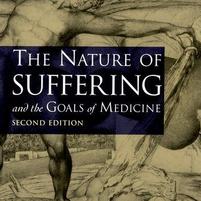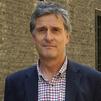In the early 2000s I worked on a study that set out to compare the experience of chronic illness and disability at different stages of life: young adulthood and mid-life vs later life and old age. Only one of the many books and papers I read for this piece of work stuck in my mind, and it was written in the middle of the 1980s by Eric Cassell, an American doctor. The title was striking - The nature of suffering and the goals of medicine. Not pain, but suffering. The distinction, and importance of the distinction for the practice of medicine, was the theme of the book. Cassell was going against the grain of modern scientific medicine by taking up such a theme and insisting on this particular word, which was of course one of the main reasons for writing the book in the first place. And that was about the sum of what I could remember. So I decided last week to re-read it. I was pleased to see that it’s still in print - which means presumably that it still has a place on reading lists somewhere or another.
Like Sherwin Nuland’s How we die (written at about the same time and also still in print), it relies so heavily on clinical experience that it could only have been written by a physician. Unlike Nuland’s book however, or indeed Atul Gawande’s Being mortal, where anecdote and example are blended with reflections, it has a strong leaning towards ‘theory’, or at least the articulation of complex abstract ideas. Written more for other doctors and the emergent breed of ethicists than for the general public, it is a book with a thesis, and the thesis dominates the anecdotes and case stories. It also differs from the Nuland and Gawande books by being only tangentially concerned with death and dying. His discussion of the role of doctors in the relief of suffering is not at all bound by the issues and problems that arise in end-of-life care.
So why read it? And what bearing does it have on the study of ageing? Part of the answer to the second question comes in a discussion of the way in which ‘disease theory’ underpins clinical practice, and there are at least two areas where practice doesn’t really square well with the theory, namely psychiatry and care of the elderly. In the latter case, he argues that the theory works, if anything, ‘too well’ - because the individual often has several identifiable diseases, and acting on this knowledge may lead not to benefits but overtreatment. The other part of the answer lies in an extended discussion of suffering in chronic illness.
Cassell wouldn’t have taken up this idea of suffering in the first place unless he had thought that clinical practice had lost something by neglecting it. Although he is at pains not to downplay the amazing improvements in therapeutic effectiveness that he had seen in his own lifetime, he relies heavily on the distinction between medical science and medical practice. Medical practice, and this is the important point, often involves more than the application of medical science to particular cases. In trying to say what this ‘more’ is, Cassell appeals to two linked ideas - suffering and ‘persons’. Suffering is experienced by ‘persons’ (not bodies) - and if doctors are to relieve it, they have to come to terms with the person who is their patient. The basic argument is that doctors too often work with “basic concepts about sickness and the nature of sick persons that are inadequate to the causes of suffering”.
Suffering, according to Cassell, “occurs when an impending destruction of the person is perceived; it continues until the threat of disintegration has passed or until the integrity of the person of the person can be resolved in some other matter”. Whether or not this counts as a definition, it certainly contains terms that don’t really belong in scientific exposition as normally understood. It leaves us at the mercy, so to speak, of ‘persons’ and their perceptions (how they experience what is happening to them) - with all that implies. It will be evident from this that Cassell has to have something like a theory of persons - and so he has, even though it is a kind of common sense view that is intended to circumvent philosophical problems about minds and bodies. Persons have pasts, roles, familial and non-familial relationships; they engage in activities which are more or less valued; they have perceived futures; and of course, they have bodies. All these various aspects of the person are susceptible to damage and loss; and “if the injury is sufficient, the person suffers”. Why should this matter to the doctor? Because doctors should be concerned to relieve suffering. Put like this, it should be evident that Cassell has to find a way not only of circumscribing the kinds of suffering with which doctors are properly concerned - but also of making it clear how far the expertise and responsibilities of doctors extends in this matter. He has to be able to say that they extend thus far and no further; and in such-and-such kinds of case but not others.
Looking back on the book now, what strikes me is the thematic overlap with ideas that were (are?) current in the sociology of health and illness. In the early 1980s, Mike Bury developed the idea of chronic illness as a form of ‘biographical disruption’, and Kathy Charmaz, also a sociologist, made an explicit link between suffering in chronic illness and ‘loss of self’. It’s sounds very much like the perceived ‘destruction of the person’, doesn’t it? Which prompts the question - what’s new in the Cassell book?
What’s different, I think, is the idiom. Cassell is not writing as a scientist or a social theorist. He is writing out of dissatisfaction with certain aspects of clinical practice, and when he casts around for the language and the ideas with which to articulate this dissatisfaction, he is more likely to turn to literature and philosophy than to social science (though George Herbert Mead does get a passing mention). He doesn’t try to place his reflections in a line of argument about the self in post-modern social theory. He is interested rather in the exercise of clinical judgement as a form of practical reasoning. How is knowledge applied to the particular case and what kinds of knowledge are relevant?
What also strikes me now is the obvious affinity between Cassell’s ideas and many recommendations and reports published in the last 20 years or so urging the adoption of ‘person-centred’ or ‘holistic’ approaches to the provision of care for older people with complex needs. Cassell’s argument aligns with what used to be a widely accepted ideal for the practice of geriatric medicine. I say ‘used to be’ not because I have firm evidence that this ideal has been replaced or modified in any way, just that there is an absence of evidence that it is alive and well, apart of course from the lip service paid to it.
When Cassell was writing, he thought that modern medicine was going through major transitions. What was true then seems no less true now, though the nature of the changes may be different. This book is important - and worth reading (even for the non-medic) - not so much because it’s right on all essential matters or because it marks a significant turning point in theorising about the practice of medicine (I’m unsure on both points); but rather because it raises a set of very interesting questions with a clear-sighted view of how they are interconnected. There are plenty of doctors and commentators on medical ethics who would take issue with an idea of suffering like Cassell’s on the grounds that it extends the responsibilities of doctors beyond their competence. To which Cassell would say that doctors cannot really fulfil their proper responsibilities unless they are able to take the measure of the suffering they confront.
* This is the first in a series of blogposts on books or papers that deserve to be remembered and re-re-read.
About the Author:
Kenneth Howse is a Senior Research Fellow at the Oxford Institute of Population Ageing. He is also a key member of The Collen Programme on Fertility, Education and the Environment.
Opinions of the blogger is their own and not endorsed by the Institute
Comments Welcome: We welcome your comments on this or any of the Institute's blog posts. Please feel free to email comments to be posted on your behalf to administrator@ageing.ox.ac.uk or use the Disqus facility linked below.













